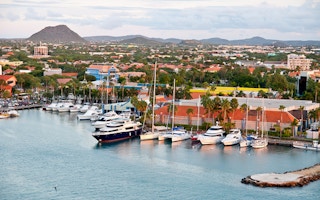Seven out of the 13 Caribbean island nations that met last week at British billionaire Richard Branson’s private isles have pledged to switch to clean energy in an effort to cut their islands’ dependence on fossil fuels and contribute to carbon emissions reduction.
St.Lucia, The British Virgin Isles, Colombia for the Islands of Providencia and San Andres (Caribbean), Turks & Caicos, Dominica, St.Kitts & Nevis and Aruba have agreed to work with the Carbon War Room (CWR), a non-profit founded by Branson, and the United States-based Rocky Mountain Institute (RMI) in their transition to renewable and energy efficient technologies.
These countries have committed to generate at least 75 per cent of its electricity from renewable energy sources.
The meeting, held at the Necker and Moskito islands, is part of the ‘Ten Island Renewable Challenge’ initiated by Carbon War Room. Other island nations that participated in the event are Antigua & Barbuda, the Cayman Islands, Grenada, Puerto Rico, St. Vincent & the Grenadines, and the US Virgin Islands.
“
The potential for more renewable energy across the world is huge especially in places like the Caribbean, where islands offer an excellent test bed to demonstrate and scale innovative, clean energy solutions
Virgin Group founder Richard Branson
The Caribbean group of islands is a tourism-haven in the region, hosts more than 25 million tourists in a year, and is home to more than 40 million residents, according to RMI.
Demo-island
On the sidelines of the event, Virgin Limited Edition and United States-based NRG Energy announced they had entered into an agreement to provide renewable power to Necker Island, Branson’s luxury island resort in the Caribbean.
The Virgin tycoon, who hosted the event, said in a statement that Necker Island could be the ideal ‘guinea pig’ to showcase the potential of the latest technology in power generation using renewable energy.
“The potential for more renewable energy across the world is huge especially in places like the Caribbean, where islands offer an excellent test bed to demonstrate and scale innovative, clean energy solutions.”
The installation is set to begin in spring and is eyed for completion by the end of the year, Branson stated in his blog.
NRG will develop the island’s microgrid, which will supply the electricity from an integrated array of solar, wind and energy storage technologies.
A microgrid is an energy management system that can distribute electricity independently from a main utility grid, while having the capacity to distribute power with the same system as the main grid. A renewable-powered microgrid integrates renewable power generation into an existing infrastructure, which typically uses diesel to generate electricity.
“With oil setting the marginal price of electricity, retail electricity prices in the Caribbean are among the highest in the world, hindering economic development, job creation and quality of life,” said David Crane, CEO of NRG.
“By tapping into each island’s specific, readily available and ample renewable energy resources, we can achieve an immediate and significant reduction of operating expenses, imported fuel cost, carbon footprint and other air emissions and noise pollution. The renewables-driven micro-grid solution being designed and installed on Necker is intended to demonstrate this and provide a scalable real life application relevant to other islands of the Caribbean,” Crane added.
The project will deploy highly distributed and locally automated and controlled installations, which can be replicated to the many island nations of the Caribbean. This would also include new energy efficiency and control automation designed to reduce energy use. The technology would also synchronise consumption with renewable energy production on the island, the statement said.
NRG, which has previously worked on solar and off-grid projects elsewhere in the Caribbean Basin, said that businesses can cut energy costs by transitioning to renewable energy and that microgrids can leverage the most appropriate fuels and technologies to provide clean, reliable and high quality power.
To make the system financially viable requires intelligent design to integrate multiple fuel sources seamlessly and optimise the system through robust demand management, NRG added.

















